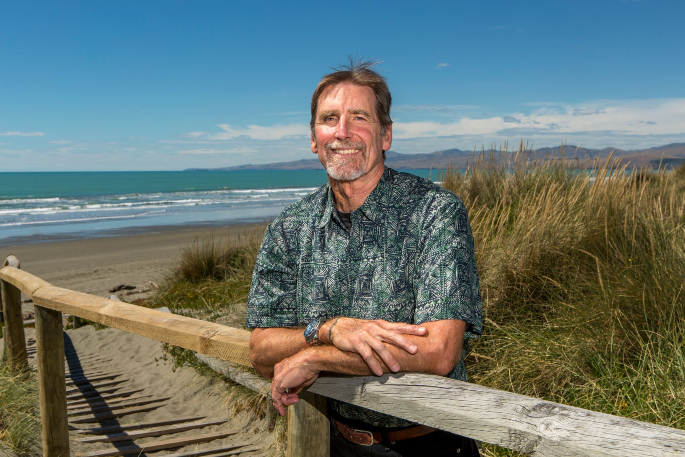Kiwis love gathering seafood, but one expert is calling for more consideration of the impacts of our enthusiasm in the wake of a summer of devastation for Kaikōura's pāua population, combined with increasing stress on marine species.
A free public talk presented by Distinguished Professor David Schiel, from the University of Canterbury's School of Biological Sciences, will explain the challenges and explore solutions for sustainable seas at the inaugural Tītohu Tūroa Sustainability Showcase on October 28 at the University of Canterbury and online.
'We have to start doing better,” says Professor Schiel.
'If we think about sustainability collectively as a society, we have to understand where the problems lie, what parts can be managed and whether we actually want to leave something for our kids and grandkids.”
One of the challenges he will discuss at the showcase is the 'absolute pillage of the pāua fishery” which had been closed for five years due to post-earthquake damage to Kaikōura's seabed.
Recreational fishing enthusiasts took an additional 38 tonnes of pāua over the allocation of five tonne. At 3000 pāua to a tonne, that's overfishing of some 114,000 pāua, a species that takes eight years to reach harvestable size. The daily limit in Kaikōura is five blackfoot pāua per person with a minimum legal size of 125mm.
'There was not enough management. We warned officials, but it was just open slather, and it took an additional seven years' worth of pāua out of that environment,” he says.
Overly enthusiastic and sometimes illegal seafood collection is not the only problem threatening our marine species. There are risks from warming seas, marine heatwaves and land-based activities.
'Usually when people think about sustainability, they think about turning off their lights, and other personal behaviours. But I deal with large-scale issues involving cross-ecosystem effects on the near-shore marine environment, and there are increasing impacts because of our land-use intensification, sediments from forestry and other outcomes from how we use the land near the sea,” says Professor Schiel.
'New Zealand's a maritime nation. We all love the sea, but we don't treat the sea very well at times. We currently have little cross-ecosystem, holistic ways of managing the marine environment.”
Professor Schiel is an accomplished researcher and science communicator who works with government and regional councils to ensure policy planning is based on the latest science.
He has published hundreds of papers within his research interests of marine intertidal and subtidal ecology and aquaculture, and is a world expert on kelp forests and temperate reefs.
Among many honours, he was elected a Fellow of the Royal Society of New Zealand, won New Zealand Science Communicator of the Year in 2015, the same year he was appointed a Distinguished Professor, and was awarded the UC Research Medal in 2016.
Despite seeing first-hand evidence that many key species 'are getting beyond their physiological limit,” Professor Schiel says he remains optimistic.
'The majority of people want to know the science, and government departments rely on what we do.”
But he says it will take a holistic approach to stop loving our oceans to death. 'Anyone who thinks there are simple solutions hasn't been paying attention.”
Professor Schiel's talk – Through the ordinary and extraordinary, are we loving our ocean resources to death? – is part of Tītohu Tūroa Sustainability Showcase, organised by UC and the Christchurch City Council (CCC) to explore the latest research and action on sustainability challenges across transport, food systems, affordable energy, urban forestry plans, use of our coastal resources, and more. UC, CCC and local industry experts will join forces to share the latest from their areas of knowledge.
Guest speakers include:
- Dr Rod Carr, Chairperson, Climate Change Commission, on Carbon Rush: Can Canterbury cash in on the changing Climate?
- Professor Te Maire Tau, Pou Whakarae, Ngāi Tahu Centre, on Whakaora te Awa | River Restoration
- Malcolm Johns, Chief Executive, Christchurch International Airport Ltd, on Carbon, Ambition & Reality
Tītohu Tūroa Sustainability Showcase is on Friday October 28 2022 from 9.15am to 5pm at the Engineering Core, University of Canterbury Ilam Campus. Join one session or join many, online or in person. See the programme and book your free tickets here.



2 comments
Govt propoganda
Posted on 11-10-2022 09:15 | By an_alias
Amazing how the paid Universities just keep trotting out the climate farce. You know its a farce when they have to put "distinguished" and "honourable" before peoples names. Amazing what $65 Billion can buy...not.
Blame game
Posted on 11-10-2022 16:39 | By Johnney
The most distinguishing fact is the public is squandering a resource because they can get away with it. Academics generally tell us it’s climate change, pollution, environment etc. It is just a lack of respect and being greedy.
Leave a Comment
You must be logged in to make a comment.